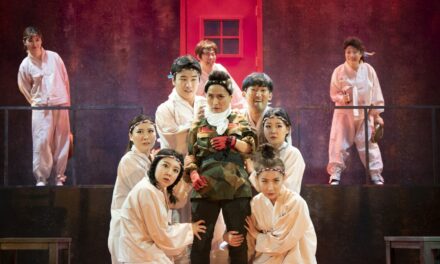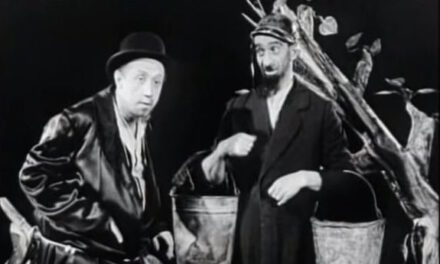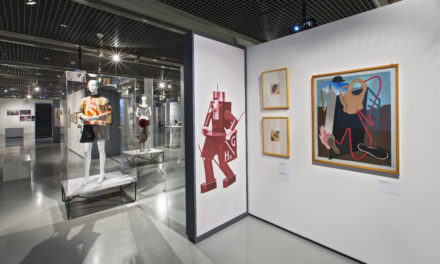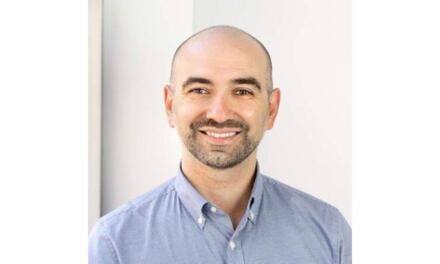Franco Ungaro works at the AMA – Accademia Mediterranea dell’Attore in Lecce (Italy), he has designed and managed, and educated many inspiring projects who are promoting contemporary Italian and international theatre and performing arts: Activities in Prison; East of The Stage; Leggere Bene. Including production of theatre performances like: Lettere a Prospero; La Regina Resta; Andrea/Prima Mia Parola; Pupe di Pane; La vita e forse cosi, among many. He is author of several books about theatre and performing arts, culture and cultural heritage like: Dimmetersi dal Sud (2006), Lecce`s Barocco (2011), Vado a Lecce (2015), East of the Stage (2021), Carmelo Bene and Other Heresis (2022).
Ivanka Apostolova Baskar: Franco, your book of reviews and essays The East Side of The Stage, was published last year 2022; all your experiences with the world of theater – collaborations, festivals, co-productions … are sublimed inside, with particular overview of your long-term collaboration with the Balkan region? Can you tell us what kind of long-term projects, engagements, experiences in many various stages, it is about?
Franco Ungaro: At a certain point in my career, I realized that my focus was predominantly on the Eastern side of European and international theatre. Ever since I was young, I had a strong desire to cross that strip of sea that unites and divides my region Puglia from Albania and the Balkan countries. I wanted to see with my own eyes what real communism was like and I was curious about cultural life in the Balkans.
After the collapse of the Berlin Wall and the communist regimes, I got in touch with theatre professors at universities to set up theatre workshops with students, I started attending your festivals (MOT (Skopje), Bitef (Belgrade), Fiat (Monte Negro) where I brought with Koreja (I was the director until 2015) some shows from our repertoire. I started reading the works of your writers and fell in love with your literature (Ivo Andric and Danilo Kis above all).
Among my long-term projects, I can mention the Inter-Act World Theatre network that we created in 2009 together with Dejan Projkovski, former director of MOT and the Macedonian National Theatre Skopje, bringing together some 40 theatres and festivals, many of them in the Balkan area and Eastern Europe. The network was active until 2013. My projects in the Balkan area are still continuing, as evidenced by the project of dramaturgical residencies between Italy and the Balkans that we are realizing together or the beautiful co-production project HUMANA VERGOGOGNA that we realized with Artopia from Skopje and Ballo of Podgorica for Matera 2019 – European Capital of Culture. The presence of artists from the Balkans in my programmes has become constant over time, having invited to Lecce, among many others, Jovan Ćirilov, Alexandar Popovski, Adrian Paci, Dejan Projkovski, Dejan Dukovski, Jeton Neziraj and for the 2023 edition of Tempora/Contempora – Alban Nimani, Gentian Koci, Marta Bjelica and Jelena Ilic, Dimitrije Kokanov and Igor Koruga.
I contributed in 2021 to the Italian co-production of All Adventurous Women Do, the beautiful text by Tanja Sljivar that will be on the Bitef programme this year.
In short, a bond that grows stronger over time.
Ivanka Apostolova Baskar: Why precisely the Balkans and the theaters on the Balkans, especially ex-Yugoslavian countries and theatres, who are part of your investigative and collaborative focus?
Franco Ungaro: I like to observe and report on the society, culture and theatre of countries in transition to new cultural and social systems, because every phase of transition brings with it elements of change, more or less radical. In some cases, transition becomes regression, in other cases it becomes progress and social and cultural innovation. The post-war period in your countries meant the arrival of democratic forms of government, although the process was not and is not everywhere linear and complete. In the theatre, we often talk about the need to combine tradition and innovation: this dialogue between tradition and innovation seems to me to be stronger in the Balkan countries and has led to the blossoming of a more interesting literature and dramaturgy than that of old Western Europe. Years ago, my meeting with your playwright Goran Stefanovski was very important to me.
Moreover, access to European programmes such as Erasmus+ or Creative Europe, resulting from your countries’ candidature to join the EU, has allowed a broader and more intense cultural exchange between West and East.
Ivanka Apostolova Baskar: Until year 2015 you was a director of Cantieri Teatrali Koreja, could you resume your professional experience, achievements there and what makes you to change your institutional focus afterwards?
Franco Ungaro: I have contributed to the foundation of the Koreja Theatre since 1985, when it all started with a friendship between four young people from Aradeo, a small village in Salento. Along the years we all worked together to create a theatre community, a group that made solidarity and collaboration its strong point. Each of us took on artistic, organisational and technical responsibilities. The 1990s and 2000s were years of transition as we tried to give the group a more professional dimension. We threw ourselves headlong into renovating an old brick factory and creating a theatre there. It was an opportunity for growth with its positive and negative sides because contradictions and conflicts and doubts emerged about Koreja’s identity, about who does what, who we are, who we want to be. In the end, the will of those whose only concern was to emerge as the owner of the theatre prevailed over that of those who, like me, wanted to strengthen the artistic dimension, the public nature of the theatre and its international role. Like me, many actors, many people who had worked for many years in the artistic and organizational staff left Koreja and created excellent independent situations of theatre creation and promotion, from Fabrizio Saccomanno and Fabrizio Pugliese to Terry Tigrato, from Ippolito Chiarello to Tonio De Nitto and others.
Ivanka Apostolova Baskar: You are a consultant for international collaborations at San Domenico Theater in Crema and Macedonian National Theater in Skopje? What is the role and the benefit of being an international consultant for theatre and performing arts?
Franco Ungaro: I believe I have contributed a lot to networking in the organisations I have worked with. I brought Koreja into Inter-Act World Theatre, I brought Koreja and the Macedonian National Theatre into ETC (European Theatre Convention), the most important network of public theatres at European level. Networking was crucial for the design work that was necessary to participate in European cooperation calls such as Culture 2000, Creative Europe (2000-2027), Interreg Trans-Adriatic and Interreg Greece-Italy. I must confess that networking and design are my favorite activities. But I have also been a tour manager for Koreja, planning tours in over 40 European and non-European countries together with my talented collaborators. At the San Domenico Theatre in Crema, my task has been above all that of planning the theatre seasons from 2016 to 2022. It is a pity that in the organizations where I worked, the wealth of knowledge and relationships I had built was lost.
Ivanka Apostolova Baskar: Currently you are manager and director of Accademia Mediterranea dell’ Attore in Lecce, and you are working on various brilliant and very brave educational projects dedicated for young professionals/younger generations in studying and creating theatre? What was the motive and the purpose to switch from Teatro Koreja to AMA?
Franco Ungaro: One of the important issues we discussed most at Koreja was how to build a generational change within us, which younger people could take on leadership and responsibility roles, given the age of the artistic and organizational managers. I did not agree with the choice of entrusting one’s sons and wives with leadership and responsibility tasks, as was the case at Koreja, a family-run and owner-run company. Strengthening the cooperative spirit and the artistic quality of the productions were the most important goals we had to pursue and would have guaranteed us further and market space, nationally and internationally. Unfortunately, these were not objectives shared by everyone.
Hence, my choice to found AMA. I try to give training and work opportunities to young people who have decided to make an important investment in their lives, perhaps the most important investment of their lives: to be and work as actors. I have invited as teachers Edoardo Winspeare, Giorgia Maddamma, Chiara Guidi, Silvia Pasello, Mario Perrotta, Enza Pagliara, Luigi Presicce, Michele Santeramo, Carla Guido, Tonio De Nitto, Barbara Toma, Ippolito Chiarello, Silvia Lodi, Marina Spada, Marinella Anaclerio, Flavio Albanese, Serena Sinigaglia, Paola Martelli to teach at my Academy, Marcello Sambati, Arturo Cirillo, Daniela Gambaro, Sonia Antinori, Gabriele Vacis, Alexandar Popovski, Daria Deflorian, Michele Abbondanza, Maria Cassi, Dejan Projkovski, Simona Gonella, Roberto Castello, Roberto Latini, Marco Manchisi, Massimiliano Civica, Roberto Anglisani, Radek Rychcik, Marco Falcomatà, Maurizio Braucci, Adrian Paci, Silvia Gribaudi, Robert Mc Neer. And I am happy that after only five years, the Academy, the only one in the Puglia region, has been supported by the Ministry of Culture.
Today AMA is above all an environment of learning, artistic production and promotion of theatre culture, and the younger generations are protagonists in this new environment where one breathes air of the future.
Ivanka Apostolova Baskar: Franco, you are also the initiator and organizer of the International Alternative Theater Festival TEMPORA/CONTEMPORA, could you share with us what is the meaning of the alternative theatre and dance today and the voice of the actors-actresses versus movements of the choreographer-performer-dancer, toward the upcoming era of AI, predominant political theatre, cuts in the funds for culture support in Europe …?
Franco Ungaro: I do not like to classify Tempora/Contempora as a festival, I prefer to call it an ‘international focus on body languages in the performing arts’. Even festivals now all resemble each other, so many shows all well packaged and the same, big communication campaigns and big budgets. I pursue a project that brings together different generations of audiences (children, young people and adults), thought and artistic practices, different artistic languages (theatre and poetry, dance and cinema, design and music, etc.). For me, putting bodies at the centre of reflection and practices means acting the body, as a laboratory for research and experimentation, which has no timetables to respect or obligations of productivity, no fixed rules to conform to. I want to find all the freedom necessary for art to flourish.
Ivanka Apostolova Baskar: Does the need for experimentations and alternative stage expressions in theatre is drying up or not?
Franco Ungaro: Dear Ivanka, ours is an age of conformism and homologation and this is also the current trend in art and theatre. Diversity and otherness is judged dangerous. Like any activity, theatre also follows capitalist production logics based on the intensive exploitation of resources, human resources and environmental resources. The theatre has become an industrial factory. Little is invested in research and experimentation. In Italy, funding is allocated to theatres on the basis of quantitative parameters (I give you more money if you produce more shows, I give you more money if you employ more actors in shows). Little or nothing is given to those who dedicate their time to experimenting with new models of creation and new languages. Above all, young artists are excluded from public funding.
Ivanka Apostolova Baskar: What is your attitude to the galloping tendencies for the internationalization of Italian art and culture after Covid?
Franco Ungaro: During the pandemic we all felt the worry of not being able to travel as we had always done in order to tour our shows or to attend our favorite festivals; we were afraid of being closed and isolated within the fences of autarky. I personally suffered so much from the impossibility of taking the show Humana Vergogna on tour, due to the lockdown, in Japan and South Korea, which we had created for Matera 2019 European Capital of Culture. And I believe that the current difficulties the theatre is experiencing is also due to the period of restrictions we have suffered: I see that many festivals only programme national artists and shows. On the contrary, I really appreciated the Italian government’s decision to launch a call for proposals to support projects, like EAST SIDE OF THE STAGE, for the internationalization of professions in the performing arts, because the mobility of people and artists, dialogue and the meeting of different cultures has always been an important as well as necessary factor for growth and development.
Ivanka Apostolova Baskar: What do you think about the contemporary state of theatre and performing arts in Italy, today (theatre versus such deeply rich amount of cultural heritage and bursting art / design history in the beautiful Italy); what are the leading styles, tendencies, trends, needs, aesthetics, tastes in contemporary Italian theatre; predictions for the upcoming years of rapid changes and unpredictability in everything in the world?
Franco Ungaro: In the pages of La lettura, the weekly magazine of Corriere della sera, the most important national daily newspaper, a debate has been going on in recent weeks on the same questions you asked me, with contributions from some of the most representative directors and actors on the Italian theatre scene. Unfortunately, I see that everyone is defending and extolling their artistic achievements and no one is answering the questions, as if nothing had changed with the web revolution, with the pandemic, with the globalization of languages.
The difficulty in answering, in my opinion, comes from the fact that in Italy, the wind of renewal has not been blowing for a long time, because the theatrical generation of ’68, bearer of instances of radical change, has become mainstream, absorbed within the institutional logic of the system. Today, the state funds theatres on the basis of seniority, historicity and quantitative parameters instead of on the basis of innovative artistic capacity and vision. This penalizes young artists in particular, who are the main creators of innovative forms and languages. The State allocates so many resources to the theatres in the big cities and almost nothing to the small towns in the provinces, where cultural consumption is still low and where the need for culture and theatre is probably felt most strongly. I realize I am very biased in my judgement, but answering the complexity of your questions would take a lot of space…
Ivanka Apostolova Baskar: Various international collaborators are saying about you – Franco doesn’t talk too much, but that’s why he works and creates a lot, and it’s a pleasure and enjoyment to work and collaborate with Franco?
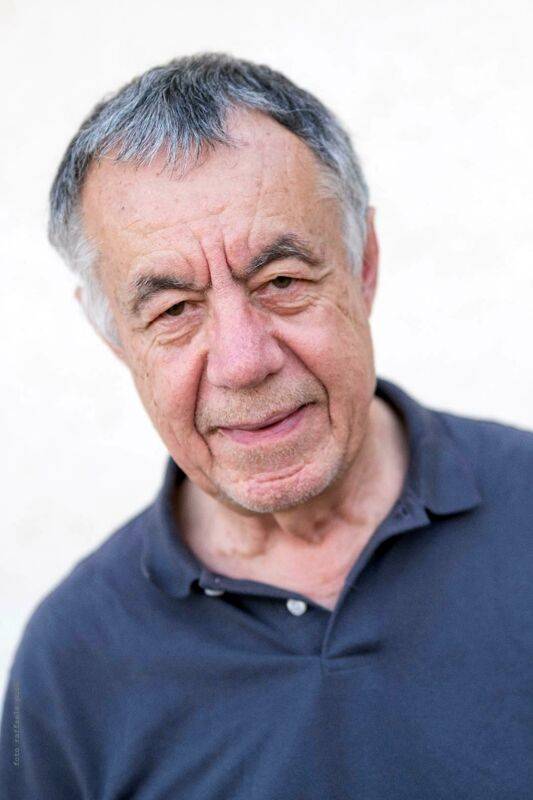
Photo Credits by Franco Ungaro
Franco Ungaro: I speak little because I am always afraid of saying useless or wrong things. I like writing more than speaking, because writing gives me time to correct, to change, to find the right words to express myself. And then I believe that speech is only one component of theatre and life; there is much more to theatre and life: action, relationship, seeing, feeling, thinking….
Ivanka Apostolova Baskar: This year 2023 you summarizes your long-term experience of traveling, discovering, writing, connecting, promoting The East Side of The Stage book, into brilliant annual and very dynamic regional project – a collaboration among various Italian and various Balkan theatre makers like Sonia Antinori, Jeton Neziraj, Dejan Dukovski, Walter Prete, Tanja Sljivar, Iskra Sukarova… as a project designer and manager – initiator, what is your observation and conclusion after this project – motivated also from the ongoing climate change intersections with art?
Franco Ungaro: The theme of climate change has become for me a paradigm of the tasks incumbent on the contemporary artist today, capable of drawing new scenarios and new visions to be shared with citizens and especially younger citizens. This theme allows us to reflect on what we have done and what we can do to improve the conditions of our planet. It allows us to enhance the participatory, utopian, imaginative dimension of theatre, a dimension that we have lost over the centuries. The work you did in Lecce together with Iskra was from this point of view very valuable for the happy intuition you had to create a manifesto of water, earth, air… We now have the task of moving from writing exercises to forms of theatrical activism that bring artists out of self-referentiality and solipsistic narcissism. I see that in the Balkans there is a more ready attitude for this change… This is why I would like the East Side of the Stage project to continue in the coming years, because we have only thrown a pebble into the stagnant waters of mainstream theatre…
Ivanka Apostolova Baskar: You have long-term experience with Macedonian theatres and stage actors, actresses, directors – since 1990s; what have you witnessed as always welcomed foreigner – during these changing years, decades and political / cultural situations in my country?
Franco Ungaro: Attending your festivals, theatres, actors and actresses, my impression has been of a very fervent theatre scene that still keeps the actor’s art alive along the lines of the noble 20th-century tradition and its avant-garde. And I very much appreciate the fact that, with the fall of the communist regimes, not all theatre in the Balkans has been privatized; the State is present in the management of theatres. I believe a lot in the public function of theatre, in its function of service to citizens. Of course, I would like to know more and better about your situation, especially with regard to the independent theatre scene and theatre life in small towns, where perhaps the need for innovative theatre practices is felt more strongly and where perhaps the State is absent…
Ivanka Apostolova Baskar: What are your theatre plans for the year 2024, Franco, what will you work on?
Franco Ungaro: As you could see in Lecce, I am committed to enhancing the figure and works of Carmelo Bene, for me the greatest Italian actor of all time. In Lecce, next to the hall of my Academy, the Carmelo Bene Archive was created with 5000 volumes of his personal library, video materials, photos and costumes from his shows. I feel the need to devote my time and energy to making CB’s role in the renewal (he would say in the destruction) of the language of theatre better known. Like Artaud, he developed the idea of theatre without spectacle, against the idea of an actor-performer in favor of an actor-artifex, against performance theatre in favor of poetry theatre.
But the most important project that awaits me is to increasingly strengthen the work of training the young, because without them there is no possible future. I would also like AMA to become a hub where students and young people from the Balkans can be welcomed and artistic and cultural exchanges with your region can be multiplied.
Thank you very much, Franco Ungaro!
This post was written by the author in their personal capacity.The opinions expressed in this article are the author’s own and do not reflect the view of The Theatre Times, their staff or collaborators.
This post was written by Ivanka Apostolova Baskar.
The views expressed here belong to the author and do not necessarily reflect our views and opinions.


